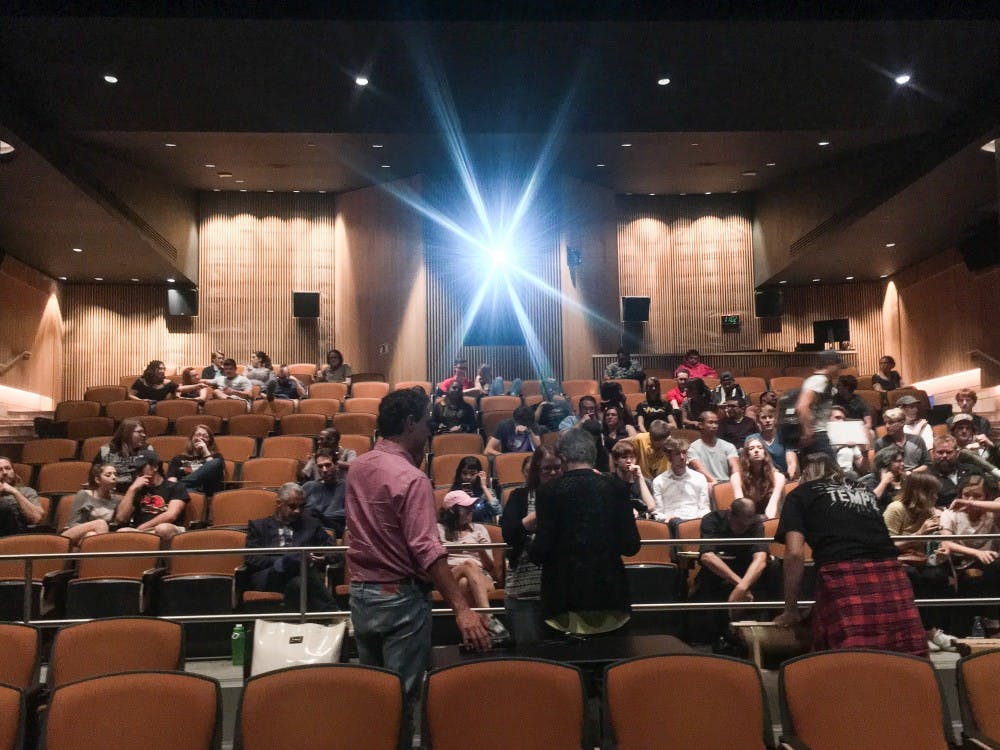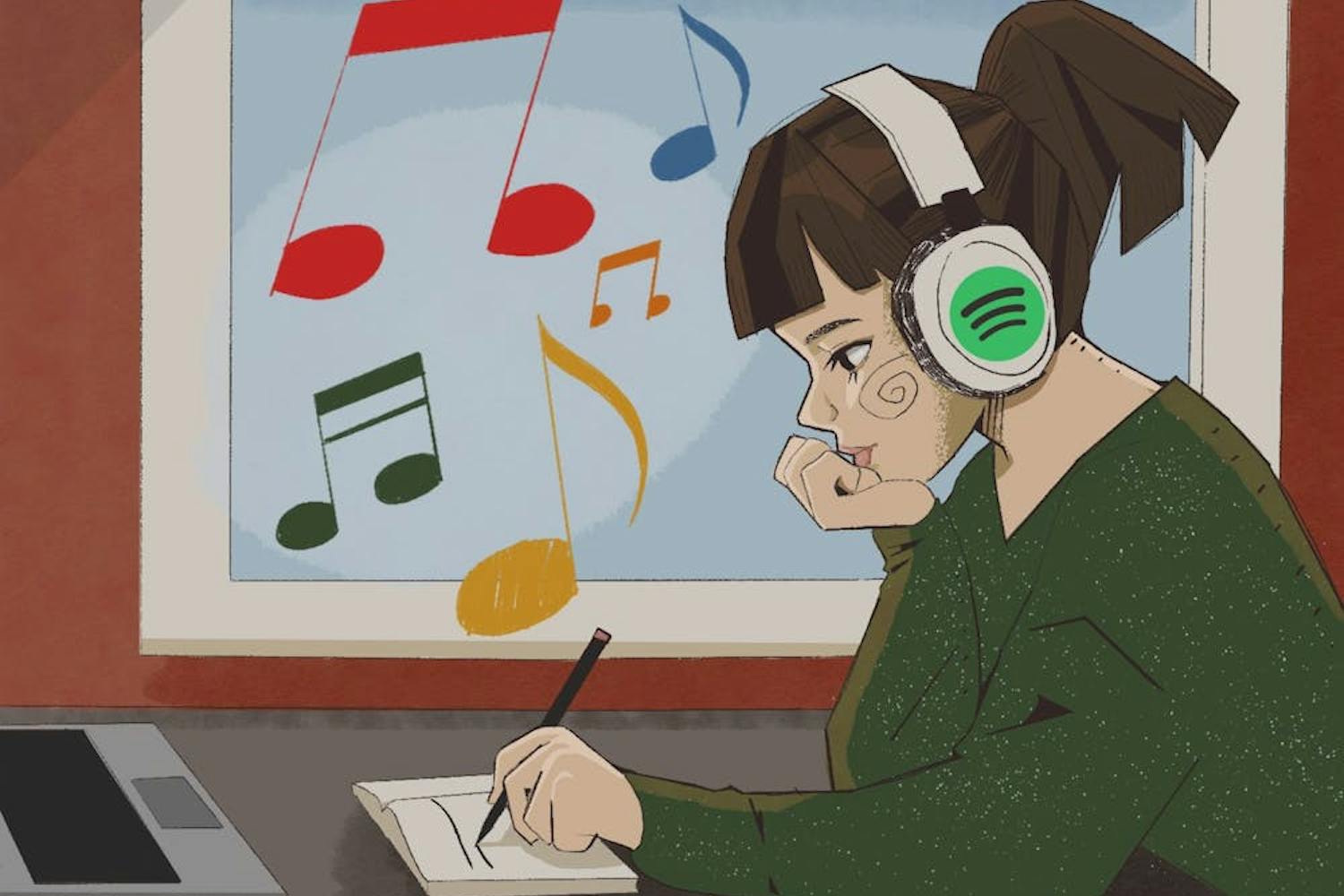On Oct. 4, the group Hollywood Invades Tempe screened the movie “Hacksaw Ridge” and brought screenwriter Robert Schenkkan out to do a Q&A with the viewers.
The film was shown at the Marston Exploration Theater to an almost full house.
"Hacksaw Ridge" is a nontraditional war movie depicting the story of Desmond Doss, a war hero who survived World War II without ever picking up a gun, and won a Medal of Honor for saving dozens of his comrades.
Andrew Hanks, a film junior, is the lead event organizer of Hollywood Invades Tempe, which screens movies and brings in filmmakers to speak to students.
"We like to pick popular films or films that have just come out so they're fresh on people's minds," Hanks said. "'Hacksaw Ridge' being nominated for six Oscars and winning two, really just a powerful movie that came out in the past year. The fact that we could get Mr. Schenkkan just made it even better."
Bailey Cadelina, supply chain management senior, said he relished the opportunity to be able to watch “Hacksaw Ridge” and then delve into the mind of its writer.
“As just a casual observer it’s really cool to go one deeper on such a harrowing film,” Cadelina said. “To learn about which parts were accurate to (Desmond Doss’s) story, and which Mr. Schenkkan added for dramatic effect was interesting to say the least.”
Schenkkan sat down with the State Press to discuss "Hacksaw Ridge" and his career.
Was it hard to write a script that felt like it lived up to Desmond Doss’s moral standard?
There were challenges because the material was under the authority of the Seventh Day Adventist Church. They had very strong feelings about Desmond and his story, and their religion. So there was a lot of negotiating in terms of issues of violence, instances of sexuality and language. Aside from that I did not find it difficult to write. Though there was an issue where the producer of Walden Media was insisting on a PG-13 rating for the movie. So we simply couldn’t get a director who thought (Hacksaw Ridge) could be done without at least an R rating. That was immensely frustrating.
War movies have often been used as propaganda to show America as moral paragons and heroes, but recently there has been a shift in the mainstream narrative that shows how dirty war is for both sides. In co-writing "Hacksaw Ridge," did you try to shy away from traditional war movie tropes?
Well, yes, I think so because Desmond Doss is the antithesis of that. As a hero, he’s a man who is a pacifist. He refuses to pick up a gun. That’s what made it so appealing to me. “Hacksaw Ridge” was so out of the box, that I didn’t even have to worry about war movie tropes.
(Director) Mel Gibson has made quite a few spiritually centered movies (“Braveheart,” “Passion of the Christ,” and “Apocalypto”) that use violence as a medium to achieve affirmation of their beliefs. In writing “Hacksaw Ridge,” did this use of violence in any way clash with your intended artistic direction?
You’re telling a war story about a guy who refuses to fight. The contradiction — while it’s fascinating — is a little hard to dramatize. The danger would be that you would create a secular saint, and that’s boring. And I don’t think it’s really fair to Desmond, and to what Desmond was able to achieve. So the trick was to not only generate a believable, and convincing exterior crisis for Desmond on the battlefield on Okinawa, but also an internal struggle that would be believable and compelling. That’s really the creative heart of that movie. I did think the use of symbolism with water was a little heavy.
Do you think the real Doss would have liked Hacksaw Ridge?
Well I hope so. I know that his son did. His son said to us afterward, “I never understood my father until now,” which is really a rather extraordinary compliment. Whether Desmond would have approved? I know Desmond was rather shy, and not one to talk about his accomplishments. He was a very modest guy. I also think that it’s fair to say now that he suffered from PTSD. Like so many veterans he wouldn’t have wanted to relive what he had experienced.
What has been your favorite piece to write across your whole career, and why?
That’s really hard. I remain very fond of the “Kentucky Cycle,” for which I won a Pulitzer because it was, and is, a very ambitious theatrical piece. Kind of bold in its scope. I still am proud of the execution. Perhaps it is even more relevant today than when I first wrote it however many years ago. I’m just as pleased with “All The Way” and “Great Society,” the two (President Lyndon B. Johnson) plays, for one of which I won the Tony Award. I love what I do, and I feel immensely fortunate to live the life I do.
To aspiring writers: Do you think it's important to stick to one genre in order to gain success?
No. I think you should write whatever you feel compelled to write. I wouldn’t worry about branding myself as a young writer. I mean listen, I’m not Catholic about any of this, which is to say I don’t feel like there’s any one way to write, or one way to have a career. For myself, I don’t think it would be helpful to choose my subject predicated on my understanding or analysis of what the market wants. I write about what moves me, or what I care about, and I just assume that if I execute well there will be interest in this material. By and large, that’s true, but not always. Like I said, there isn’t one way. Write where your passion is, and that’s always what should guide you because otherwise it’s too hard a business. It’s a marathon, not a sprint. It’s a very long commitment that’s rugged and unfair.
As a viewer, is there a piece of work — play, TV series or movie — that you recognize as being a masterpiece?
There are many. Every year I reread (Eugene O’Neill’s) "Long Day’s Journey Into Night," just to remind myself of its masterfulness. I also revisit "Lawrence of Arabia," which I think is a brilliant screenplay. That’s Robert Bolt and then David Lean directing, and the performance by Peter O’Toole. Particularly the first half of that movie is really kind of flawless. There’s really so much good work out there, and we’re really kind of fortunate with the extraordinary stuff available to us. I also love the "The Usual Suspects," as a movie. It’s my favorite film.
The next Hollywood Invades Tempe screening will be "Wonder Woman," directed by Patty Jenkins on Oct. 18 at 8 p.m.
Reach the reporter at aalmouai@asu.edu or follow @shazzam_96 on Twitter.
Like The State Press on Facebook and follow @statepress on Twitter.




